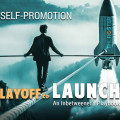
The Glass Jar Metaphor How to Help Your Friends Help You
The Challenge of Self-Perception
I recently met a friend for breakfast. Like many brilliant and curious people, my friend is reluctant to let others pigeonhole him regarding his career or title. He feels it might stifle his creativity and lock him into something long-term.
Here is what I told him—something I didn’t fully understand until relatively late in my career: "All your friends and colleagues want to help you. To do that, they need to understand what you are looking for and be able to describe you and your talents quickly and effectively to their friends and colleagues. If you cling to an amorphous 'generalist' positioning for yourself, it makes it impossible for your friends to know who to talk to and how to help you."
I get it. It’s hard to see our strengths and weaknesses objectively.
It's like being trapped inside a glass jar, unable to read our own label on the outside.
I first encountered the glass jar metaphor in David C. Baker's book, “The Business of Expertise”a, and again in Donald Miller’s book, "Building a StoryBrand." I don’t know if Donald got it from David or David got it from Donald. Perhaps neither. However, David C. Baker shared a valuable exercise that helped me and may help you.
The Simple Exercise That Changed My Perspective
Email 10, 15, or even 20 people who have worked with you throughout your career. They could be friends, colleagues, or even associates, but they must have worked with you and formed an opinion about you. Don’t tell anyone else that you’re writing to them. Simply ask, 'How would you describe my unique capability or towering strength? Please respond with the one thing that comes to mind when you think about my skillset.'
You’ll be surprised by how similar the responses are when they write back. This overlap is the “Venn Diagram” of your unique skillset as experienced by your colleagues.
I put this to the test back in 2017 when David's book first came out, sending 20 emails to friends and colleagues and receiving a 70% response rate.
Hi [Recipient],
I hope this message finds you well.
I recently came upon an insightful concept:
We often can't see our own strengths objectively, like being inside a jar, unable to read the label outside.
This idea resonated with me and included a simple exercise to gain clarity. The exercise involves asking people you've worked with, "How would you describe my unique ability?" The responses often align remarkably well, which intrigued me.
So, I'd love your input on this: How would you describe my unique ability?
Thank you!
Best,
[Your Name]
What I Discovered
As predicted, all the responses were remarkably similar:
I’m good at pulling people together who have not worked together to accomplish things that would not likely get done otherwise.
The sooner you “know thyself,” the sooner you can share this information with friends who want to help you. Try this exercise. It can be a game-changer!
Join the Conversation
Your comments are welcome. Please let me know if this article is helpful. If you complete the exercise, please share what you learned.
Related Articles
In today's job market, effective self-promotion is essential for career growth. Mastering this skill can significantly enhance your visibility and …
Before we dive into personal branding, let me share my career journey: a blend of entrepreneurial ventures and traditional roles, all punctuated by …

